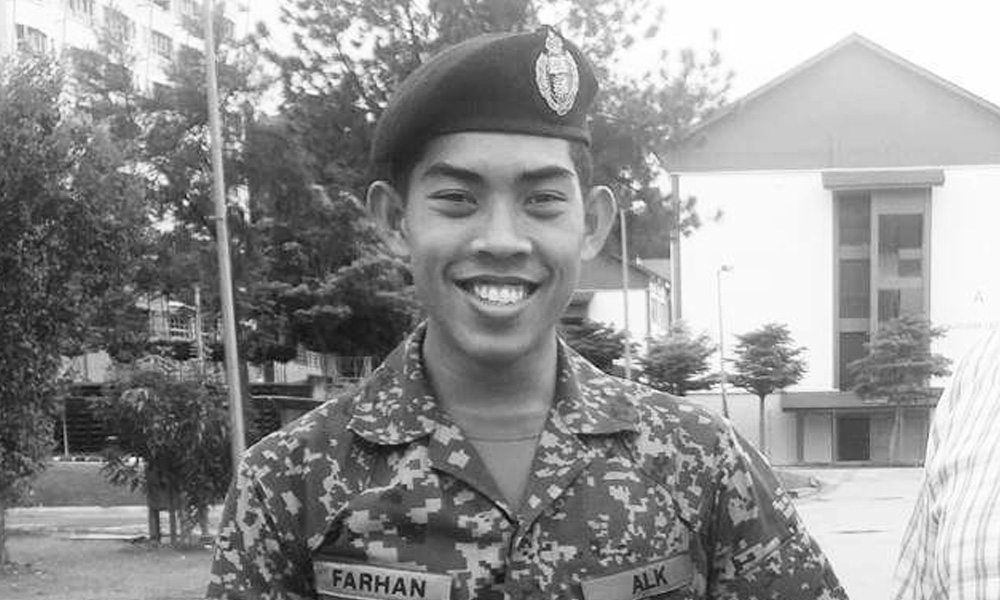The murder of navy cadet Zulfarhan Osman Zulkarnain was a shocking portrayal of violence, human nature, power, and superstitious beliefs in 21st-century Malaysia. It is the story of the descent of a group of adults into moral decay.
More importantly, if any of us want to predict what happens to a society without rules, look no further than the events of May/June 2017, when the accused, all 18 of them, took part in a sadistic ritual of torturing Zulfarhan.
It is all the more horrific because he was not killed in a remote, inaccessible backwater, or a deserted island far away from civilisation where no rules exist. He was murdered within spitting distance of the cosmopolitan metropolis - Kuala Lumpur.
The irony is that the murder occurred at the Universiti Pertahanan Nasional Malaysia (UPNM), an institution of higher learning, where a community of students, scholars, and teachers live highly regulated lives.
He was tortured on campus, where students from diverse backgrounds live in relative harmony and treat others with respect.
In the end, one man’s obsession with the theft of his laptop forced the others to dispense with the basic rules of morality and humanity. He held power over them.

They feared him so they failed to speak up. They ignored the difference between right and wrong. They reverted to the darker side of their human nature, which is characterised by violence, cruelty, and lack of self-control.
Sadly, Zulfarhan’s death also shows how the university failed to protect him and neglected its duty of care, towards both him and his murderers.
If anecdotal evidence is to be believed, students alleged that the complaints procedure about bullying and ill-treatment is poorly managed.
This is the failure of the system, not just at UPNM, but also at other universities. Over several years, we have read numerous stories of students being bullied and sexually harassed by their fellow students and lecturers. Their complaints remain largely unresolved.
Many students fear that the authorities will punish them for fabricating stories. Others fear they will not be believed. This means that few students bother to lodge complaints, as they deem it a waste of time.
In Zulfarhan’s case, was there no warden at the university lodgings to check on the welfare of the students?
He was in considerable pain having been beaten and scalded. He must have been screaming in agony. Did no one hear him? Did his accusers gag him to stop him from making noise?
Had no one, not even his lecturers, been aware? When he was tortured, was his absence not recorded? Did the other students in his class or his dormitory not notice either?
Haul bomoh to court
Some people may disagree, but Zulfarhan’s murder is also the story of how some members of the community, despite their strong religious convictions, possess a strong, unhealthy attachment to superstitious beliefs.
His problems began when one of the students, Muhammad Akmal Zuhairi Azmal, accused him of stealing his laptop. Although he denied that he was responsible, Akmal and his peers disbelieved him.
One of Akmal’s peers, who was among the six adults accused of killing Zulfarhan, consulted his father about the theft. He claimed his father was steeped in “traditional medical practices and possessed the gift of finding lost items”. This is a euphemism for bomoh (witch doctor).
The traditional medical practitioner held a prayer session, which was followed by a premonition. He then named Zulfarhan as the person who stole the laptop.
If anyone else is to be charged in court, then this bomoh should also be tried and sentenced.
It was his irresponsible “premonition” which misled the group. They listened to this bomoh’s careless and dangerous accusation and they were convinced by him, that they were prepared to torture Zulfarhan to extract a confession.
This bomoh exacerbated the train of events which led to the cadet’s death.
Will he regret what he did? Will he apologise for being the catalyst towards Zulfarhan’s torture and subsequent death?
Despite the beatings and steam iron torture, Zulfarhan denied stealing the laptop. His mother also told the police that her son had no reason to steal a laptop, as he already had a new one.
Actions of coach, doctor
The motto of the university is “Kewajipan, Maruah, Integriti” (Duty, Honour, Integrity). Ironically, there was little evidence of these over the 12 days which led to Zulfarhan’s death.
The motto was missing among his friends and hostel mates, including the coach who was sent an anonymous letter alerting him about the torture but did nothing.
They all betrayed him by failing to act. Otherwise, Zulfarhan’s life could have been saved.
Were they afraid of the power held by this core group of murderers?
Twelve other young adults participated in the torture. Did they also lose all sense of morality? What happened to parental upbringing, family values, or religious teachings?
It is also concerning that the clinical staff did not lodge a police report when they saw the extent of Zulfarhan’s injuries.
He had been beaten and scalded with an iron. Did the doctors simply accept the explanations and excuses given by Zulfarhan’s torturers when they finally took him to a clinic in Bangi?
Will Higher Education Minister Zambry Abdul Kadir promptly deal with bullying in universities? Where are the guidelines?
He should intervene now before more lives are lost. - Mkini
MARIAM MOKHTAR is a defender of the truth, the admiral-general of the Green Bean Army, and the president of the Perak Liberation Organisation (PLO). Blog, X.
The views expressed here are those of the author/contributor and do not necessarily represent the views of MMKtT.



No comments:
Post a Comment
Note: Only a member of this blog may post a comment.